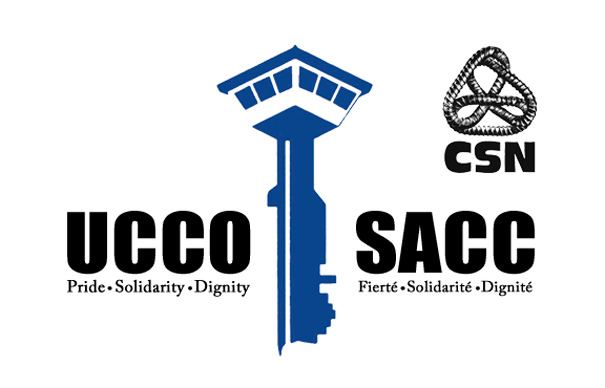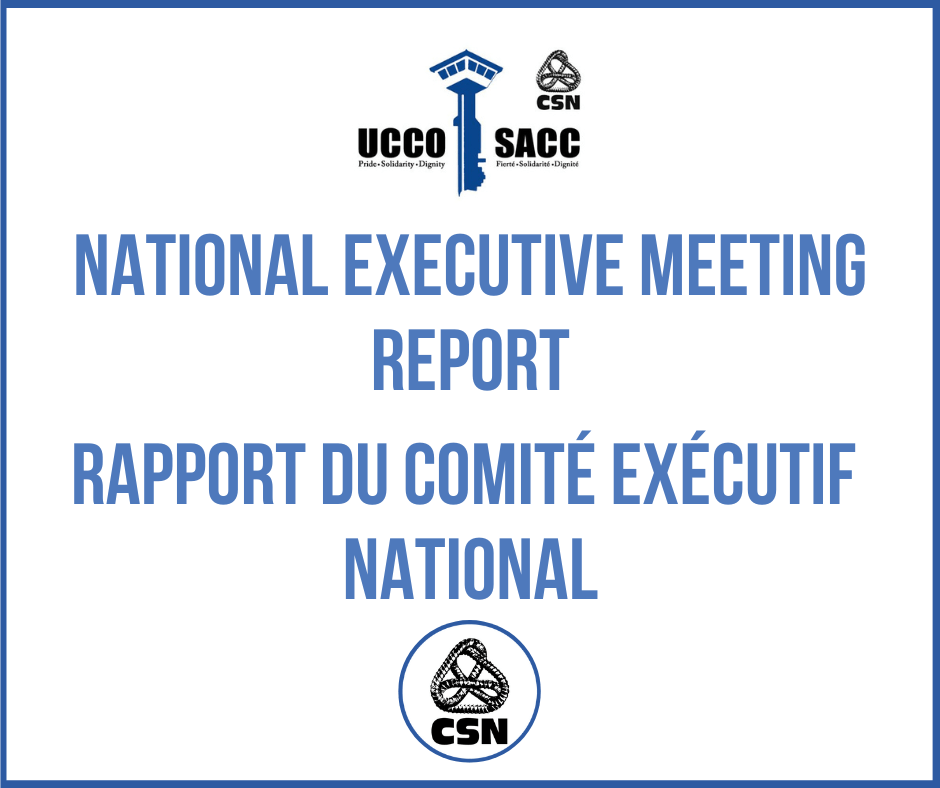Fall is here, and summer behind us. We hope everyone had a good rest during the holidays. This autumn has been busy with several files that affect our daily work and our negotiations. Solidarity is the key in these negotiations. We must remain proud, united, and strong in the coming days and weeks. Here are a few files that have been on our radar in the last few weeks.
Negotiations
In addition to two sessions of Collective Agreement negotiations, the bargaining committee met with Correctional Service of Canada for one Global Agreement session held on October 4th, 2024. After more than a year since the last meeting, CSC appointed a spokesperson. We reviewed our respective demands and discussed several proposals from each side to get a clear idea of what is at stake. In particular, we reminded the employer of the purpose of the Global Agreement, which is to deal with issues more specifically of interest to both our membership and the CSC. The next negotiation sessions will be held on October 22 to 24 with the Treasury Board for Collective Agreement discussions and on November 1st with CSC for the Global Agreement. All the demands are available on our website for reference. For those of you who are active on social media, please be mindful that the employer (TBS, CMs, and Wardens), is keeping a close eye on posts regarding our negotiations and some posts could negatively affect its course.
Schedules
CSC maintains confusion over the framework to adopt schedules across the country. National headquarters says it is sending clear instructions to sites and regions to proceed as outlined in its 2020 scheduling labour relations bulletin. As for local or regional management, they say they have no clear instructions from Ottawa, leaving us to wonder who is telling the truth. Very few sites have managed to get approval for minor schedule changes. Let us not forget that more than a year ago CSC attempted to impose new schedules as soon as possible, on its terms. We are still waiting for the Correctional Service to follow through with the mutually accepted scheduling guidelines.
Violence at Work.
Every month, on several platforms, we have mentioned the increase in violence between inmates and against officers. This increase in violence is not a normal working condition. We have asked the Commissioner to act swiftly and forcefully to put an end to this problem. Alarmed at the rise in inmate violence, we have asked for increased inmate accountability and for more effective inmate charge systems, as well as a review of both major and minor court, as we feel the majority of concerns stem from this inept system. We have asked CSC to take rapid action. The Commissioner has said she would take action and informed the union that she recently sent an email recently reminding inmates to be respectful. Unfortunately, it will take much more than an email to reverse the escalation of violence within our walls. We, therefore, continue to press for meaningful changes to address the realities of inmate behavior and the risk it represents to our Correctional Officers.
Health Service
The Health Sector seems to want to make our penitentiary more and more like the community. We’ve had a few meetings and would like to have more on issues such as drug distribution, the harmful needle exchange program, interactive hourly rounds by nurses in treatment centers and the new CD 585 on the national strategy for drugs in institutions. We believe CSC’s community-styled approach should not be the approach in a carceral setting. We work in federal prisons with federally sentenced prisoners who have committed serious crimes, not in the community with members of the public. The safety of Correctional Officers, of all Correctional staff, of inmates, and the public are all affected by the policy decisions CSC chooses to make regarding drugs and inmate healthcare. We are on the front lines where its policies can have direct, immediate, and potentially fatal consequences. We are following the Health Sector’s initiatives and proposed initiatives very closely.
Frisk Gloves
The issue of purchasing proper frisk gloves has been ongoing since 2016. At that time, a joint union-management subcommittee drew up precise specifications for optimal protection. Among other things, these technical specifications were designed to protect against accidental needle stick injuries during searches. Far too many Correctional Officers in this country have been injured by bodily fluids, and they, along with their immediate families, have experienced high levels of stress during the ensuing period of uncertainty and treatment. We have received samples of a glove that meets these criteria, namely HexAmor® gloves and Mechanics Wear® gloves. When samples of these two gloves were tested by dozens of Correctional Officers participating in a cross-country pilot project, they provided the necessary protection and functionality. Overall, the HexArmor® gloves rated most favorably. CSC had told us that the supply process was so tight that these gloves would probably be the only ones on the list. Unfortunately, a numbered company, HKK, was awarded the contract by entering the lowest bid. HKK has already sent the first shipment. Not only do the gloves not meet the criteria set by the subcommittee, but they also appear to be of very poor quality. At the October National Labour-Management Committee meeting, the National Executive demonstrated the poor quality of the gloves to the Commissioner by easily pushing a needle through. We are astounded that, despite all the work that we did up front, the employer failed to quality control its purchase to ensure the safety of Correctional Officers, especially considering CSC’s insistence on implementing prison needle exchange programs.
Miscellaneous
At the Labour Management forums in which we participated during the fall; we discussed the safety concerns of children in institutions regarding CSC mother-child program. We discussed ongoing pay system issues, the gradual arrival of body scanners, and the Public Service Employment Survey (PSES). The National Executive encourages our members to participate in the survey, whose results will be shared with the union. We asked questions related to the use of one of CSC’s facilities to house immigration detainees, and we discussed CSC’s decisions to withhold the union leave in the Quebec region. We discussed vehicle replacements and have been shown this fiscal year’s roll-out plan for ordered Detector Dog vehicles as well as Patrol Vehicles. When briefed on the status of new recruits, we were told that 205 recruits have successfully completed the last ten Correctional Training Programs and that 238 recruits are currently in training. The Commissioner informed us of her intention to visit Beaver Creek and Port Cartier Institutions.
Be safe everyone.
Your National Executive.

